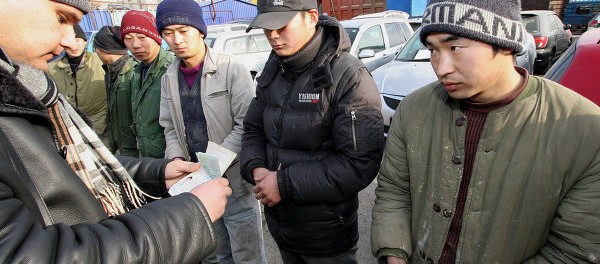Belarus to invite more migrant workers
Our countryside needs foreign migrants to work in agriculture, says Deputy Minister
 Migrant workers in Belarus
Migrant workers in Belarus
Belarus is interested in foreign migrants who will work and live in the countryside, The Minsk Herald learned from Belarusian Deputy Interior Minister Nikolai Melchenko.
He remarked that a great piece of work will be completed this year to change the legislation that regulates the legal status of foreigners. The Belarus government focuses on attracting employable-age migrants, including for the Belarusian countryside.
“Statistics disproves the popular opinion that Belarus attracts pension-age migrants. For instance, the age group 16-59 years prevailed in the number of men, who arrived in Belarus last year. The number of migrants over 60 years old and more than that was three times as small as the number of people aged 14-30,” said the official. He stressed that both the quantity and quality parameters of external migration flows improved in 2013. The number of migrant men with university degrees, vocational school degrees increased while the number of migrants with general secondary education and basic education decreased.
Contracts were signed to allow nearly 18,200 working migrants to arrive in Belarus in 2013. Most of them are blue-collar workers (13,100). Qualified specialists totaled 2,725 people. The number of service sphere and trade industry workers totaled 789. As many as 784 people specialize in agriculture, with the number of executives at 779.
Most of the migrants arrived in Belarus from:
- Ukraine (6,928),
- China (3,020),
- Turkey (1,336),
- Lithuania (1,218),
- Uzbekistan (1,280).
An analysis of the applications submitted by foreigners demonstrates that many of them are ready to reside in the countryside. The number of rural Belarusians is declining just like the number of employable-age people. “In this situation we should use the migration resource in full. Particularly taking into account the fact that Belarusians tend to avoid taking jobs that involve physical labor, moreover in rural areas,” added Nikolai Melchenko.
External migration incentives are designed to encourage blue-collar workers and qualified specialists to come and settle in Belarus permanently.
Naturally housing accommodation and compensations could be an encouraging factor. The national demographic security program allocates Br2.8 billion per annum to pay the compensations. “The Interior Ministry understands the importance of regulating external migration and has taken over the payment of benefits to employable-age foreigners, who have been permitted to permanently reside in Belarus as the blue-collar workers and specialists that Belarusian companies need,” noted Nikolai Melchenko. “The time to work out legal acts is extremely limited, however, I am sure we will be up to the job. Thus, as from 12 July 2014 Belarus will commission an entire mechanism to regulate migration in line with the national demographic security program”. Regional accommodation plans now specify areas and enterprises where migrants will reside and will be employed. Administrative procedures have been changed to limit the time needed to review a permanent residence permit application to 30 days. Legislation will be adjusted to allow foreigners to get monetary compensations before a residence permit is issued.
Now it is up to regional authorities to put efforts into getting specialists with the necessary qualifications for the relevant enterprises. “A positive response to an application from a working-age migrant, the readiness to welcome him or her in our country will result in the arrival of more foreigners, who are ready to work in the countryside. Attention to labor migrants will shape the trust of foreigners towards local authorities and the feeling of one’s pertinence,” believes the Deputy Interior Minister. “The majority of foreigners feel grateful for the country that allows them to calmly live and work. The existing legislative barriers will allow filtering out unwanted elements during the registration and application stage”.
The official pointed out that sometimes in order to protect interests of citizens and law-abiding foreigners the Interior Ministry is forced to annul temporary or permanent residence permits. Quality external migration is determined by the calmness of the country’s population among other things, stressed Nikolai Melchenko.
Thus in Q1 2014 over 1,000 temporary residence permits were annulled, nearly 50% up from Q1 2013. The number of permanent residence permits that get annulled has risen, too. The number of foreigners, who have been deported and exiled from Belarus, has risen. This year has also seen an increase in issued temporary and permanent residence permits.



Leave a comment